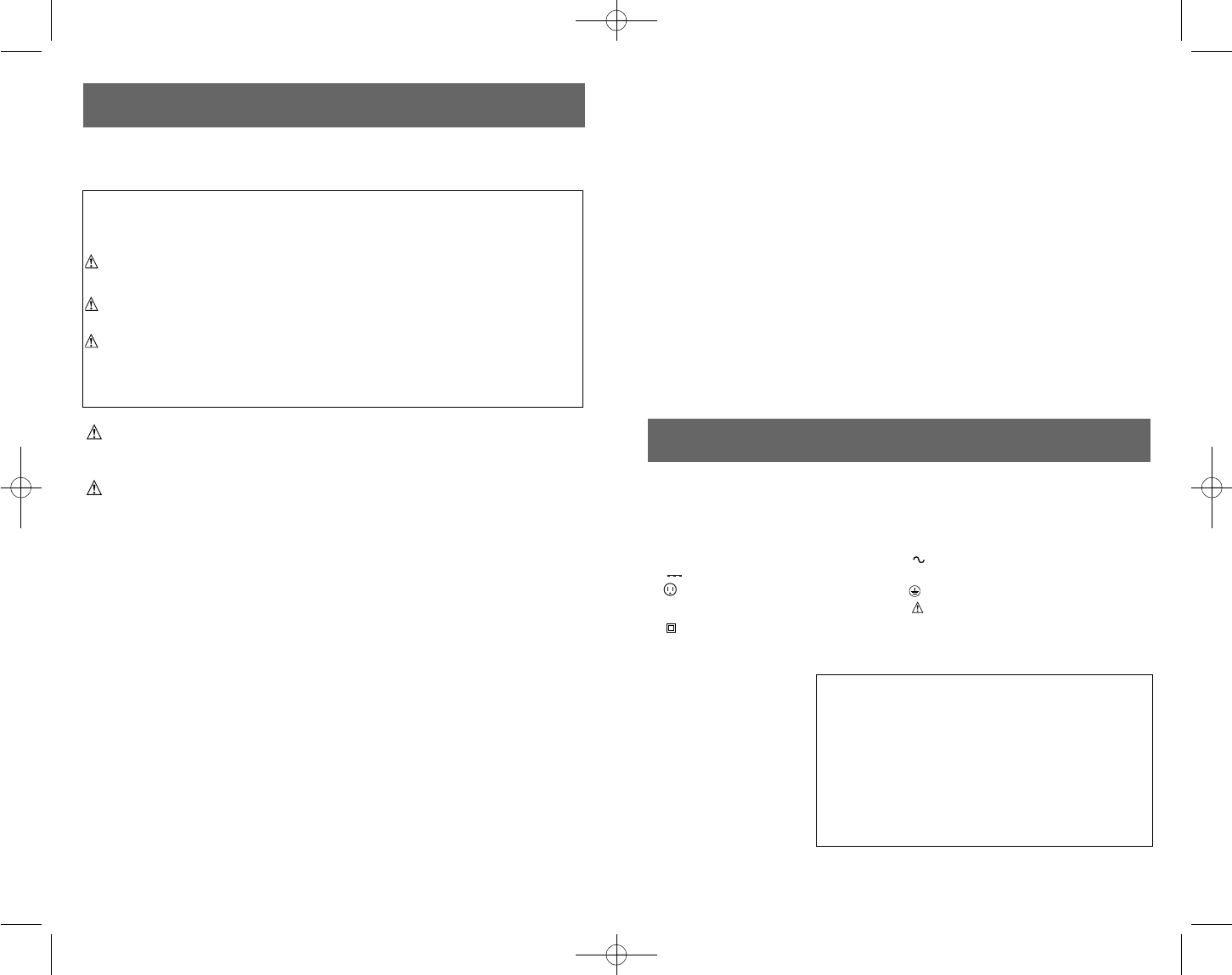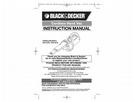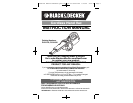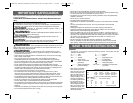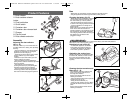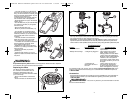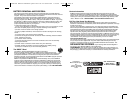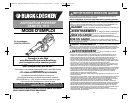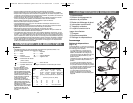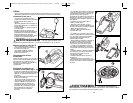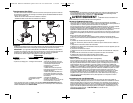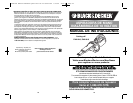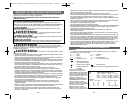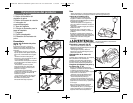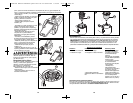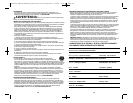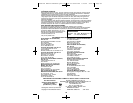2 3
When using electrical appliances, basic safety precautions should always be followed,
including the following:
PLEASE READ AND UNDERSTAND ALL INSTRUCTIONS BEFORE USING THE
UNIT.
WARNING: Some household dust contains chemicals known to the
State of California to cause cancer, birth defects or other reproductive harm such as
asbestos and lead in lead based paint.
WARNING: To reduce the risk of fire, electrical shock or injury:
• Close supervision is necessary when any appliance is used by or near children. Do
not allow to be used as a toy.
• Shock Hazard. To protect against risk of electrical shock, do not put unit or charging
base in water or other liquid.
• Do not use dry hand vacs to pick up liquids, toxic substances, flammable or
combustible liquids such as gasoline or use in areas where they may be present.
• Do not use wet/dry hand vacs to pick up toxic substances, flammable or combustible
liquids such as gasoline or use in areas where they may be present.
• Do not operate in the presence of explosives and/or flammable fumes or liquids.
• Shock Hazard. Do not operate any appliance with a damaged cord or charger or after
the appliance malfunctions, is left outdoors, dropped into water or is damaged in any
manner. Return the appliance to any authorized service facility.
• Do not use dry hand vacs outdoors or on wet surfaces.
• Do not abuse the cord. Never carry the charger or base by the cord or yank to
disconnect from an outlet; instead grasp the charger and pull to disconnect. Keep
cord away from heated surfaces. Do not pull cord around sharp edges or corners.
• Do not allow the cord to hang over the edge of a table or counter or touch hot surfaces. The
unit should be placed or mounted away from sinks and hot surfaces.
• Do not use an extension cord. Plug the charger directly into an electrical outlet.
• Use the charger only in a standard electrical outlet (120V/60Hz).
• Do not attempt to use the charger with any other product; do not attempt to charge this
product with any other charger. Use only the charger supplied by the manufacturer to
recharge.
• Keep hair, loose clothing, and all parts of body away from openings and moving parts.
• Do not insert accessories when unit is running.
• Shock Hazard. Do not handle plug or appliance with wet hands.
• Do not put any object into unit openings. Do not use with any openings blocked; keep
free of dust, lint, hair, and anything that may reduce air flow.
• Fire Hazard. Do not vacuum burning or smoking materials, such as lit cigarette butts,
matches or hot ashes.
• Do not use on or near hot surfaces.
• Use extra caution when cleaning on stairs.
• This appliance is intended for household use only and not for commercial or industrial
use.
• Use only as described in this manual. Use only manufacturerʼs recommended
attachments.
• Unplug the charger from outlet before any routine cleaning or maintenance.
• This product includes rechargeable nickel cadmium batteries. Do not incinerate
batteries as they will explode at high temperatures.
• Leaks from battery cells can occur under extreme conditions. If the liquid, which is a
20-35% solution of potassium hydroxide, gets on the skin (1) wash quickly with soap
and water or (2) neutralize with a mild acid such as lemon juice or vinegar. If the liquid
gets into the eyes, flush them immediately with clean water for a minimum of 10
minutes. Seek medical attention.
• Do not look into the air vents when the unit is switched on, as sometimes
there is a possibility of small debris being discharged from the air vents, especially
after cleaning / replacement of the filters as debris inside the unit can be disturbed.
Symbols
• The label on your tool may include the following symbols. The symbols and their
definitions are as follows:
V..................volts A ..................amperes
Hz................hertz W..................watts
min ..............minutes ................alternating current
............direct current
n
o ................no load speed
................Class I Construction ..................earthing terminal
(grounded) ................safety alert symbol
................Class II Construction .../min or rpm ........revolutions or reciprocation
(double insulated) per minute
• When using an extension
cord, be sure to use one
heavy enough to carry the
current your product will
draw. An undersized cord
will cause a drop in line
voltage resulting in loss of
power and overheating.
The following table shows
the correct size to use
depending on cord length
and nameplate ampere
rating. If in doubt, use the
next heavier gauge. The
smaller the gauge number,
the heavier the cord.
IMPORTANT SAFEGUARDS
SAFETY GUIDELINES - DEFINITIONS
It is important for you to read and understand this manual.
The information it contains relates to protecting YOUR SAFETY and PREVENTING
PROBLEMS. The symbols below are used to help you recognize this information.
DANGER: Indicates an imminently hazardous situation which, if not
avoided, will result in death or serious injury.
WARNING: Indicates a potentially hazardous situation which, if not
avoided, could result in death or serious injury.
CAUTION: Indicates a potentially haz ard ous situation which, if not
avoided, may result in minor or mod er ate injury.
CAUTION: Used without the safety alert symbol indicates potentially
hazardous situation which, if not avoided, may result in property damage.
SAVE THESE INSTRUCTIONS
Minimum Gauge for Cord Sets
Volts Total Length of Cord in Feet
120V 0-25 26-50 51-100 101-150
(0-7,6m) (7,6-15,2m) (15,2-30,4m) (30,4-45,7m)
240V 0-50 51-100 101-200 201-300
(0-15,2m) (15,2-30,4m) (30,4-60,9m) (60,9-91,4m)
Ampere Rating
More Not more American Wire Gauge
Than Than
0-6 18 16 16 14
6 - 10 18 16 14 12
10 - 12 16 16 14 12
12 - 16 14 12 Not Recommended












